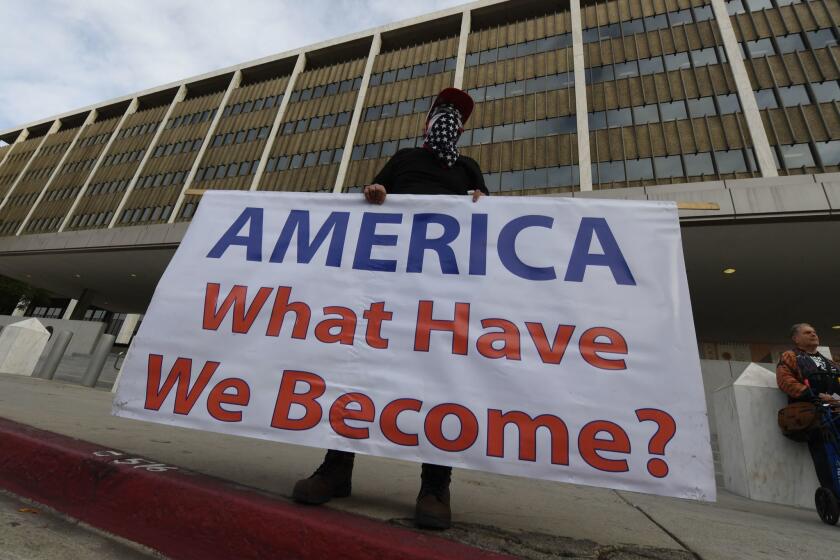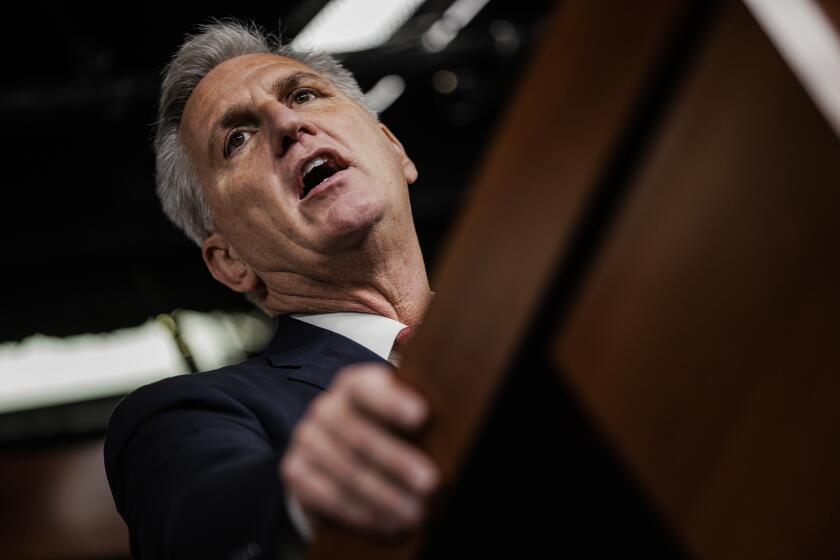Political stress: Can you stay engaged without sacrificing your mental health?

- Share via
It’s been two weeks since Donald Trump won the presidential election, but Stacey Lamirand’s brain hasn’t stopped churning.
“I still think about the election all the time,” said the 60-year-old Bay Area resident, who wanted a Kamala Harris victory so badly that she flew to Pennsylvania and knocked on voters’ doors in the final days of the campaign. “I honestly don’t know what to do about that.”
Neither do the psychologists and political scientists who have been tracking the country’s slide toward toxic levels of partisanship.
Scientists explain how our politics got so bad that we can’t come together to confront common threats like the national debt, climate change and COVID-19.
Fully 69% of U.S. adults found the presidential election a significant source of stress in their lives, the American Psychological Assn. said in its latest Stress in America report.
The distress was present across the political spectrum, with 80% of Republicans, 79% of Democrats and 73% of independents surveyed saying they were stressed about the country’s future.
That’s unhealthy for the body politic — and for voters themselves. Stress can cause muscle tension, headaches, sleep problems and loss of appetite. Chronic stress can inflict more serious damage to the immune system and make people more vulnerable to heart attacks, strokes, diabetes, infertility, clinical anxiety, depression and other ailments.
In most circumstances, the sound medical advice is to disengage from the source of stress, therapists said. But when stress is coming from politics, that prescription pits the health of the individual against the health of the nation.
“I’m worried about people totally withdrawing from politics because it’s unpleasant,” said Aaron Weinschenk, a political scientist at the University of Wisconsin–Green Bay who studies political behavior and elections. “We don’t want them to do that. But we also don’t want them to feel sick.”
Modern life is full of stressors of all kinds: paying bills, pleasing difficult bosses, getting along with frenemies, caring for children or aging parents (or both).
The stress that stems from politics isn’t fundamentally different from other kinds of stress. What’s unique about it is the way it encompasses and enhances other sources of stress, said Brett Ford, a social psychologist at the University of Toronto who studies the link between emotions and political engagement.
For instance, she said, elections have the potential to make everyday stressors like money and health concerns more difficult to manage as candidates debate policies that could raise the price of gas or cut off access to certain kinds of medical care.
Layered on top of that is the fact that political disagreements have morphed into moral conflicts that are perceived as pitting good against evil.
“When someone comes into power who is not on the same page as you morally, that can hit very deeply,” Ford said.
Partisanship and polarization have raised the stakes as well. Voters who feel a strong connection to a political party become more invested in its success. That can make a loss at the ballot box feel like a personal defeat, she said.
There’s also the fact that we have limited control over the outcome of an election. A patient with heart disease can improve their prognosis by taking medicine, changing their diet, getting more exercise or quitting smoking. But a person with political stress is largely at the mercy of others.
“Politics is many forms of stress all rolled into one,” Ford said.
Weinschenk observed this firsthand the day after the election.
“I could feel it when I went into my classroom,” said the professor, whose research has found that people with political anxiety aren’t necessarily anxious in general. “I have a student who’s transgender and a couple of students who are gay. Their emotional state was so closed down.”
As election season nerves kick into overdrive, a psychologist shares research-backed ways to ease your mind.
That’s almost to be expected in a place like Wisconsin, whose swing-state status caused residents to be bombarded with political messages. The more campaign ads a person is exposed to, the greater the risk of being diagnosed with anxiety, depression or another psychological ailment, according to a 2022 study in the journal PLOS One.
Political messages seem designed to keep voters “emotionally on edge,” said Vaile Wright, a licensed psychologist in Villa Park, Ill., and a member of the APA’s Stress in America team.
“It encourages emotion to drive our decision-making behavior, as opposed to logic,” Wright said. “When we’re really emotionally stimulated, it makes it so much more challenging to have civil conversation. For politicians, I think that’s powerful, because emotions can be very easily manipulated.”
Making voters feel anxious is a tried-and-true way to grab their attention, said Christopher Ojeda, a political scientist at UC Merced who studies mental health and politics.
“Feelings of anxiety can be mobilizing, definitely,” he said. “That’s why politicians make fear appeals — they want people to get engaged.”
On the other hand, “feelings of depression are demobilizing and take you out of the political system,” said Ojeda, author of “The Sad Citizen: How Politics is Depressing and Why it Matters.”
“What [these feelings] can tell you is, ‘Things aren’t going the way I want them to. Maybe I need to step back,’” he said.
If we can’t agree about wildfires, public health or vanquishing a foreign enemy, maybe ‘non-partisanship’ is dead.
Genessa Krasnow has been seeing a lot of that since the election.
The Seattle entrepreneur, who also campaigned for Harris, said it grates on her to see people laughing in restaurants “as if nothing had happened.” At a recent book club meeting, her fellow group members were willing to let her vent about politics for five minutes, but they weren’t interested in discussing ways they could counteract the incoming president.
“They’re in a state of disengagement,” said Krasnow, who is 56. She, meanwhile, is looking for new ways to reach young voters.
“I am exhausted. I am so sad,” she said. “But I don’t believe that disengaging is the answer.”
That’s the fundamental trade-off, Ojeda said, and there’s no one-size-fits-all solution.
“Everyone has to make a decision about how much engagement they can tolerate without undermining their psychological well-being,” he said.
Lamirand took steps to protect her mental health by cutting social media ties with people whose values aren’t aligned with hers. But she will remain politically active and expects to volunteer for phone-banking duty soon.
“Doing something is the only thing that allows me to feel better,” Lamirand said. “It allows me to feel some level of control.”
In the months leading up to this week’s election, some agencies that specialize in helping Americans relocate abroad have noticed a surge in interest.
Ideally, Ford said, people would not have to choose between being politically active and preserving their mental health. She is investigating ways to help people feel hopeful, inspired and compassionate about political challenges, since these emotions can motivate action without triggering stress and anxiety.
“We want to counteract this pattern where the more involved you are, the worse you are,” Ford said.
The benefits would be felt across the political spectrum. In the APA survey, similar shares of Democrats, Republicans and independents agreed with statements like, “It causes me stress that politicians aren’t talking about the things that are most important to me,” and, “The political climate has caused strain between my family members and me.”
“Both sides are very invested in this country, and that is a good thing,” Wright said. “Antipathy and hopelessness really doesn’t serve us in the long run.”











